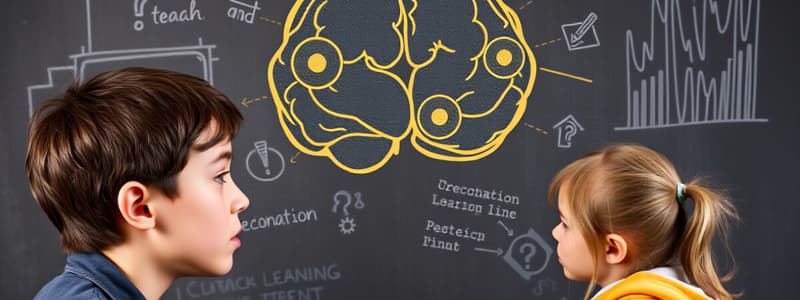Podcast
Questions and Answers
A relatively permanent change in behavior or mental processes as a result of practice or experience is called _____.
A relatively permanent change in behavior or mental processes as a result of practice or experience is called _____.
- Learning (correct)
- Training
- Knowledge
- Intuition
In classical conditioning, what is paired with the UCS to produce learning?
In classical conditioning, what is paired with the UCS to produce learning?
- CS
- CR
- UCR
- Neutral Stimulus (correct)
In Pavlov's original classical conditioning experiments, the _____ was the neutral stimulus, the _____ was the stimulus that would elicit a reflex, and _____ was the reflexive response.
In Pavlov's original classical conditioning experiments, the _____ was the neutral stimulus, the _____ was the stimulus that would elicit a reflex, and _____ was the reflexive response.
- Tone; meat powder; salivation (correct)
- Salivation; meat powder; sounding the tone
- Meat powder; salivation; sounding the tone
- Meat powder; tone; salivation
Another word for 'learning' is _____.
Another word for 'learning' is _____.
A(n) _____ is an unlearned reaction evoked by a stimulus without any learning.
A(n) _____ is an unlearned reaction evoked by a stimulus without any learning.
Any stimulus that elicits an unconditioned response without previous conditioning is a(n) _____.
Any stimulus that elicits an unconditioned response without previous conditioning is a(n) _____.
A stimulus that, before conditioning, does not naturally bring about the response of interest is called _____.
A stimulus that, before conditioning, does not naturally bring about the response of interest is called _____.
_____ conditioning occurs when a neutral stimulus becomes associated with an unconditioned stimulus to elicit a conditioned response.
_____ conditioning occurs when a neutral stimulus becomes associated with an unconditioned stimulus to elicit a conditioned response.
A previously neutral stimulus that, through repeated pairings with an unconditioned stimulus, produces a conditioned response is now called a(n) _____.
A previously neutral stimulus that, through repeated pairings with an unconditioned stimulus, produces a conditioned response is now called a(n) _____.
A(n) _____ is a learned reaction to a previously neutral stimulus due to repeated pairings.
A(n) _____ is a learned reaction to a previously neutral stimulus due to repeated pairings.
Most phobias are explained by _____.
Most phobias are explained by _____.
Classical conditioning falls under which perspective of psychology?
Classical conditioning falls under which perspective of psychology?
The occurrence of a learned response only to a specific stimulus, but not to other, similar stimuli is called stimulus _____.
The occurrence of a learned response only to a specific stimulus, but not to other, similar stimuli is called stimulus _____.
Extinction _____.
Extinction _____.
When a neutral stimulus is paired with a previously conditioned stimulus to become a conditioned stimulus as well, this is called _____ conditioning.
When a neutral stimulus is paired with a previously conditioned stimulus to become a conditioned stimulus as well, this is called _____ conditioning.
Learning in which voluntary responses are controlled by their consequences is called _____.
Learning in which voluntary responses are controlled by their consequences is called _____.
_____ increases the likelihood that a behavior will occur, whereas _____ decreases that likelihood.
_____ increases the likelihood that a behavior will occur, whereas _____ decreases that likelihood.
Primary reinforcers _____.
Primary reinforcers _____.
Secondary reinforcers increase the probability of a response, and _____.
Secondary reinforcers increase the probability of a response, and _____.
Flashcards are hidden until you start studying
Study Notes
Learning Concepts
- Learning is defined as a relatively permanent change in behavior or mental processes resulting from practice or experience.
- Conditioning is used as another term for learning.
Classical Conditioning Fundamentals
- Classical conditioning involves pairing a neutral stimulus (NS) with an unconditioned stimulus (UCS) to produce a learned response.
- In Pavlov's experiments, the tone (NS) was paired with meat powder (UCS) to elicit salivation (unconditioned response, UCR).
Key Terms in Conditioning
- An unconditioned response (UCR) is an automatic reaction to a stimulus without prior learning.
- An unconditioned stimulus (UCS) refers to any stimulus that naturally elicits a response without conditioning.
- A neutral stimulus (NS) does not naturally trigger the response of interest before conditioning occurs.
Classifications in Conditioning
- Classical conditioning results in a conditioned response (CR), which is a learned reaction to a conditioned stimulus (CS) that was previously neutral.
- The conditioned stimulus (CS) becomes a signal for the conditioned response after repeated pairings with the UCS.
Phobias and Conditioning
- Most phobias are explained through classical conditioning, demonstrating the impact of learned associations on behavior.
Psychological Perspectives
- Classical conditioning is categorized under the behavioral perspective of psychology, emphasizing observable behaviors.
Advanced Concepts in Conditioning
- Stimulus discrimination refers to a learned response being specific to a particular stimulus rather than generalized to similar stimuli.
- Extinction in classical conditioning is the gradual suppression of a learned behavior, often when the CS is presented without the UCS.
- Higher order conditioning occurs when a neutral stimulus is paired with a previously conditioned stimulus to also elicit a conditioned response.
Operant Conditioning
- Operant conditioning involves learning where voluntary behaviors are influenced by their consequences, either through reinforcement or punishment.
- Positive reinforcement increases the likelihood of a behavior, while punishment decreases that likelihood.
Reinforcers
- Primary reinforcers address biological needs and enhance the probability of a response, whereas secondary reinforcers derive their value from prior learning and can also influence responding.
- The effectiveness of secondary reinforcers is based on the learning of their reinforcing properties.
Additional Concepts in Learning
- A response can be strengthened by adding a stimulus, enhancing the probability of that behavior occurring in the future.
Studying That Suits You
Use AI to generate personalized quizzes and flashcards to suit your learning preferences.




